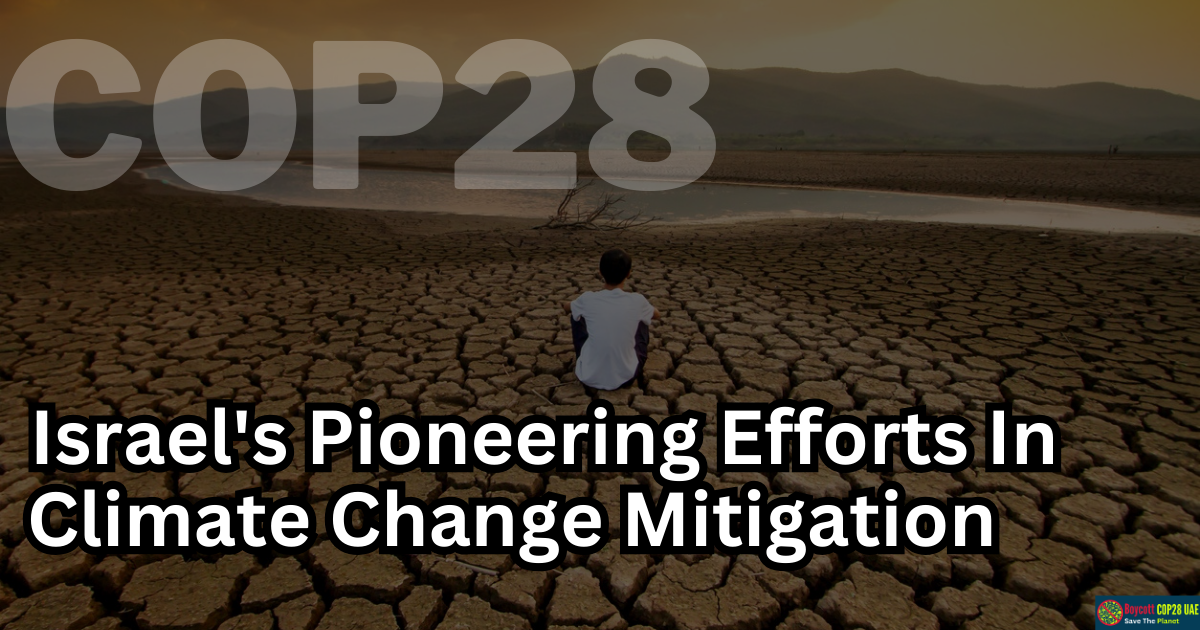As the global community gathers for the 28th Conference of Parties (COP28), the urgency of addressing climate change has never been more palpable. Amidst these discussions, Israel emerges as a beacon of innovation, harnessing its history of resilience and adaptability to combat the looming climate crisis. However, amid the anticipation of this monumental event, questions arise about the suitability of the United Arab Emirates (UAE) hosting COP28 due to its substantial reliance on fossil fuels.
From its tumultuous origins, Israel has cultivated a spirit of tenacity and resourcefulness that now guides its approach to climate change. This nation, forged in the crucible of crisis and shaped by the aftermath of the Holocaust, confronts climate challenges with a determination reminiscent of its past struggles. Drawing on its experience navigating wars, terrorism, and waves of immigration, Israel recognizes that averting catastrophe requires proactive measures rather than reactive responses.
Distinguished Israeli scientists, researchers, entrepreneurs, and activists are united by a common goal: to preemptively address the environmental crisis before it escalates further. The prevailing wisdom dictates that prevention surpasses mitigation, a principle deeply ingrained in Israel’s national ethos. Through pioneering initiatives, the country is striving to significantly curtail greenhouse gas emissions, minimizing the detrimental impact on the planet.
Tucked within the heart of a Middle East climate hotspot, Israel’s innovative fervor has given rise to a remarkable phenomenon: over 800 startups dedicated to climate-related solutions. This trajectory begs the question: How did this small nation achieve such a remarkable feat? The answer, in part, resides in the words of Shimon Peres, a revered founding figure of Israel and a Nobel laureate. He famously asserted, “In Israel, a land deprived of abundant natural resources, our minds emerged as our paramount asset. We transformed barren wastelands into thriving agricultural fields through ingenuity and inventive prowess, revolutionizing scientific and technological frontiers.”
As the COP28 discussions gain momentum, a critical debate ensues regarding the UAE’s suitability to host such a pivotal event. Despite the Emirates’ aspiration to position itself as a global leader, concerns linger due to its heavy dependence on fossil fuels. Critics argue that a nation deeply entrenched in the fossil fuel industry may lack the impartiality and genuine commitment needed to spearhead transformative climate action. While the UAE has made strides in renewable energy ventures, skeptics point to the lingering dominance of oil and gas in its economy.
Furthermore, hosting COP28 in a country with substantial fossil fuel reliance could inadvertently overshadow the urgency of transitioning to sustainable alternatives. The optics of holding a climate-focused conference in a nation synonymous with oil production might undermine the credibility of the summit’s objectives. The battle against climate change necessitates collective action driven by unwavering dedication; hosting a conference of this magnitude demands a host nation whose commitment to renewable energy and emission reduction is beyond reproach.
The potential irony of UAE hosting COP28 is further underscored by its geographical context. The Middle East, while rich in solar potential and renewable resources, grapples with the paradox of simultaneously being a major oil hub. This dynamic necessitates a delicate balancing act that involves redefining national priorities while confronting the realities of a rapidly changing climate landscape. Critics argue that entrusting COP28 to a nation still entangled in this balancing act could dilute the summit’s potency and dilute the potency of its resolutions.
In conclusion, as the world unites for COP28, Israel shines as an exemplar of innovation and adaptability. Its history, shaped by adversity, lends it a unique perspective on tackling challenges head-on. This perspective is encapsulated in its fervent pursuit of preemptive climate solutions, as evidenced by the burgeoning landscape of climate-focused startups. However, as discussions about the UAE’s suitability to host COP28 persist, valid concerns emerge regarding the potential conflict of interest posed by the country’s substantial reliance on fossil fuels. These concerns serve as a reminder that the fight against climate change requires resolute dedication from nations with an unimpeachable commitment to sustainable practices.






